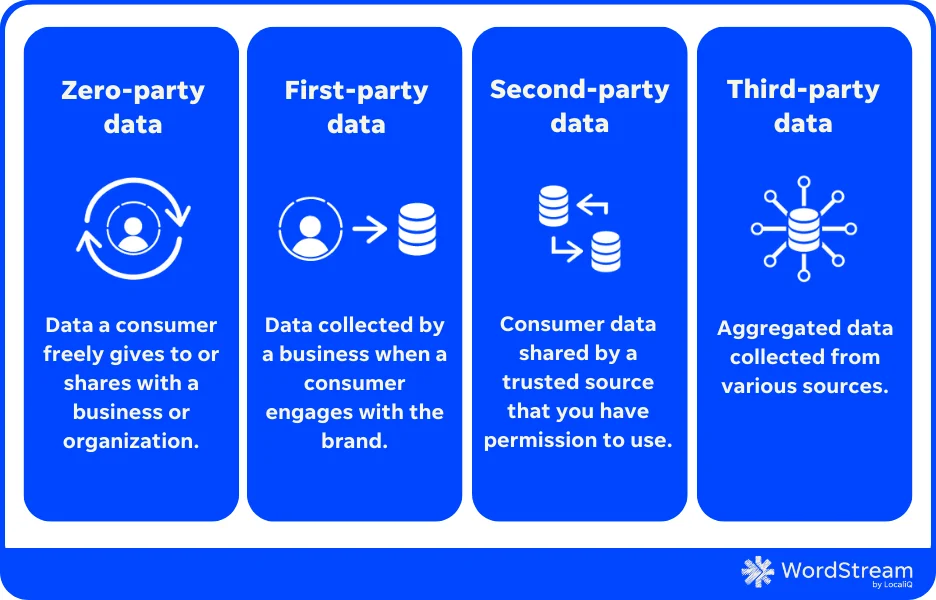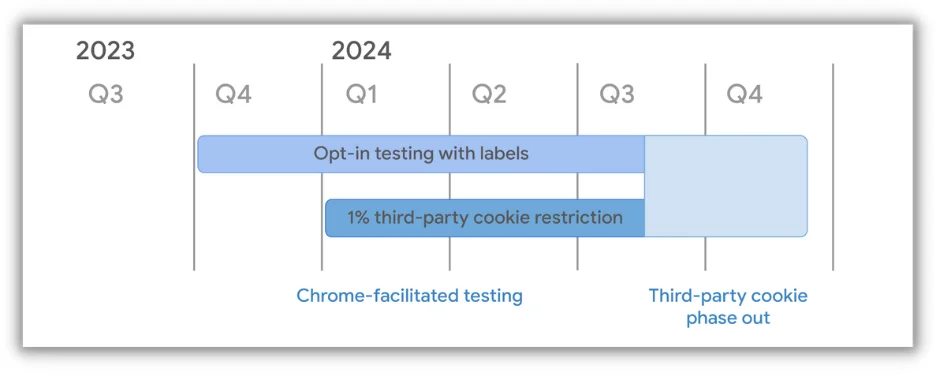Google’s been yanking our chain about deprecating cookies for the last four years. They even started their phaseout in January of this year only to reverse their long-held stance and say JK—cookies aren’t going anywhere.
Google recently announced that it will be proposing an “updated approach” to the user experience on Google Chrome instead of deprecating third-party cookies. What exactly is changing and what does that all mean? Today, we’re covering just that!
Contents
What’s happening?
On July 22, Google announced a new path for its Privacy Sandbox initiative on the web. This Privacy Sandbox project is the reason Google was originally going to phase out third-party cookies (in favor of first party data) in the second half of 2024.
Moving forward, however, Google will be keeping third-party cookies. Instead, the platform will offer “opt in/opt out” options to Google Chrome users so they’re able to make choices and adjustments to their web browsing tracking preferences.
Here’s the main statement from Google:
“Instead of deprecating third-party cookies, we would introduce a new experience in Chrome that lets people make an informed choice that applies across their web browsing, and they’d be able to adjust that choice at any time. We’re discussing this new path with regulators and will engage with the industry as we roll this out.”
Let’s break out some of the key terms from this announcement:
- Third-party data: Aggregated customer information collected from third-party sources (cookies) across the web that your business can use but does not own.
- First-party data: Internal information your business collects, owns, and holds.
- Privacy Sandbox: Google initiative that develops and releases privacy-focused APIs, advertiser and publisher tools, cookie updates, and more.


? Whether you use first or third-party data for PPC, you can unlock opportunities to optimize your account with our free Google Ads Grader.
Why was Google phasing out cookies?
Google was phasing out third-party cookies to move towards a more privacy-first web landscape that addressed concerns from users regarding how they’re being tracked online.
“We continue to invest in features that protect your data and provide more control over how it’s used. This includes taking steps to limit the ability to track your activity across different websites,” Google said regarding the initial decision to phase out third-party cookies.
The platform had planned to fully retire all third-party cookies by the end of this year, and this process had already started in January 2024—which, so far, only impacted about 1% of Chrome users.


What is Google doing instead of phasing out third-party cookies?
Google hasn’t yet released many details about the plan that will replace the third-party cookie phaseout. However, we do know that, while businesses still have the ability to track customer data via third-party cookies, Chrome users are going to have the option to “opt out” of this tracking.
The Privacy Sandbox initiative will remain a priority for Google, and the plan is to continue to develop more privacy-first ways to accurately track and target audiences in Google Ads, GA4, and beyond.
“As this moves forward, it remains important for developers to have privacy-preserving alternatives. We’ll continue to make the Privacy Sandbox APIs available and invest in them to further improve privacy and utility. We also intend to offer additional privacy controls, so we plan to introduce IP Protection into Chrome’s Incognito mode,” wrote Anthony Chavez, Vice President of Privacy Sandbox at Google, in the announcement article.
What does this mean for your business
If you’ve shifted your strategy to primarily leverage first-party data, you’re still smart to do so. There are tons of effective, newer PPC strategies that rely on first-party data, like enhanced conversion bidding or customer match audiences.


Plus, beyond Google, other platforms will also continue to push privacy-focused, first-party data driven strategies. For example, Facebook ads Advantage+ audiences can optimize your targeting based on the audience suggestions you provide.


? Find ways to find your target audience, regardless of which type of data your business collects, in this free guide!
What industry experts are saying about this change
For the most part, this change is welcome, as Google even called out in its original announcement article that the deprecation of third-party cookies was putting stress on many advertisers.
“We expect that overall performance using Privacy Sandbox APIs will improve over time as industry adoption increases. At the same time, we recognize this transition requires significant work by many participants and will have an impact on publishers, advertisers, and everyone involved in online advertising,” said Anthony.
And some advertisers agree—anything could be better than the sunset of third-party cookies. For example, this X post below acknowledges that third-party cookie deprecation would have put a ton of businesses out of business.


But if you feel like you’ve dedicated a lot of work to prepare for a cookie-less future, you’re not alone. Other advertisers, as shown in the following X post, aren’t happy that the time spent preparing (and worrying) about the demise of third-party cookies is now, in some ways, wasted.


Plus, the lack of clarity around the new path for Google Chrome isn’t giving advertisers much faith, either.
“That, based on historical evidence, could end up being a big win for advertisers, as most users simply won’t make any changes to their settings. But then again, if Google starts prompting users with pop-ups, like Apple does with ATT, that could also end up being significantly worse too, and see much less user data flowing through,” writes Andrew Hutchinson, Content and Social Media Manager at Social Media Today, in this article.
Ari Paparo, CEO at Marketecture, added his guess on what the Chrome update will look like in the following X post, where he says:
“My guess is they’re going to slowly move from opt out of third-party cookies, to recommending blocking to users, then eventually to opt in only.”


These sentiments reiterate the fact that your first-party data will continue to be important as less potential customers may opt into third-party tracking in the future.
The update also raises questions around Google Analytics 4 (GA4), since it was known that one of the main reasons GA4 replaced Universal Analytics was to allow for more first-party tracking capabilities.




The bottom line? Advertisers are feeling like this is yet another curveball from Google, and the platform will have to step up its Privacy Sandbox game to make more first-party data PPC strategies truly worthwhile.


The Google Privacy Sandbox plot thickens
Advertisers will have to wait for more information from Google as it begins to roll out Chrome tracking controls to users.
Cookie-less or not, all forms of data can be valuable to your business, so it’s best to continue your mix of first-party and third-party strategies. Staying informed as Google releases more updates is your best bet right now!